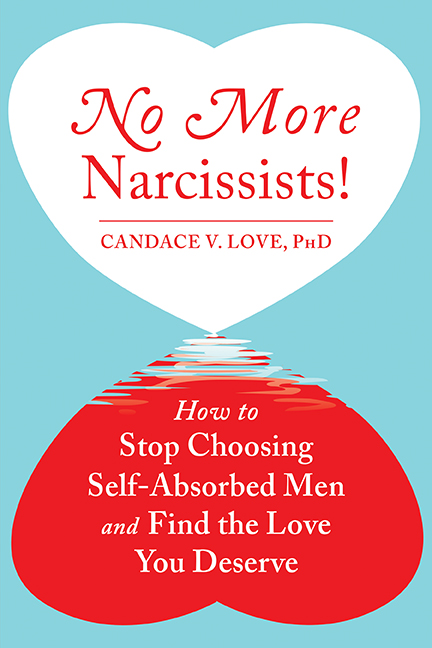by Candace V. Love, PhD
Certainly no one picks a self-absorbed narcissist as a love interest intentionally, but because narcissists are so charming at the beginning of a relationship, anyone can be taken in. Once the charm fades, as it always does with a narcissist, many people end the relationship. But there are some who continually fall victim to the narcissist’s charm and stay in the relationship long after the charm has faded and the critical, controlling, and self-serving behaviors take its place. Why?
The answer lies in your childhood. Using the framework of schema theory, it begins with negative childhood experiences that give rise to negative and distorted core beliefs you hold about yourself and the world. These negative core beliefs shape the way you interact with your environment—trapping you into maladaptive patterns of thinking and behaving. They are life traps.
There are seven life traps that people who are attracted to and/or stay with narcissists tend to have:
Abandonment Life Trap – You primarily feel rejection
Core belief: People will always leave you
Mistrust and Abuse Life Trap – You feel hurt
Core belief: People hurt or manipulate you
Emotional Deprivation Life Trap – You feel misunderstood
Core Belief: No one is there for you/or understands you
Defectiveness/Shame Life Trap – You feel inadequate, unlovable, and unworthy
Core Belief: You are not good enough to love
Subjugation Life Trap – You suppress your wants and needs in order to please someone else.
Core Belief: You don’t feel you have a choice. If you don’t meet someone else’s needs, that person won’t care about you.
Self -Sacrifice Life Trap – You choose to take responsibility for others and feel guilty when you don’t, but also feel resentment at taking care of others.
Core Belief: You need to help or fix others
Unrelenting Standards Life Trap – You need to strive to be the best in everything, to have things be perfect, or to follow self-imposed rigid rules.
Core Belief: Whatever you do is never good enough
People with one or more of these life traps are drawn to people who trigger their trap because it feels familiar to them. For example, if you had a parent who only showed you love and affection when you agreed with them or met their wants and needs, you would grow up with the belief that in order for someone to care for you, you need to subjugate your wants and needs to theirs. When dating a narcissist who only thinks of what they want and need, this pattern will feel familiar to you, and you will fall into the trap of subjugating your wants and needs for theirs, for fear they will stop caring for you. This is why you keep picking narcissists instead of the prince you deserve.
See also: Compassion for Self-Esteem Regulation: A Psychodynamic Perspective
But it’s not your fault. You didn’t cause the negative childhood experiences that shaped your patterns of thinking and behaving or your core beliefs and subsequent life traps. But change is always possible through recognizing these patterns. To change your life traps and increase your chances of picking a prince instead of a frog, you’ll need to:
-
Identify your life traps and core beliefs
-
Identify how these have impacted your relationship choices
-
Replace old maladaptive ways of thinking and coping with new healthy skills. These include education on behavioral change; defining healthy relationships; cognitive behavioral techniques such as realistic thinking; mindfulness meditation; self-care behaviors and creating healthy boundaries, limit-setting and values.
You can learn to change and free yourself from the life that traps you into continually picking narcissists and finally get the love you deserve.
See also: What Love in the Information Age Asks of Us
 Candace V. Love, PhD, is a clinical psychologist who is passionate about helping women avoid narcissistic relationships. She is the author of No More Narcissists!
Candace V. Love, PhD, is a clinical psychologist who is passionate about helping women avoid narcissistic relationships. She is the author of No More Narcissists!


 Why Journaling Is Especially Helpful to Adult Children of Emotionally Immature Parents
Why Journaling Is Especially Helpful to Adult Children of Emotionally Immature Parents